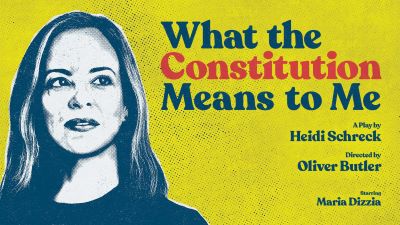WHAT WHAT THE CONSTITUTION
MEANS TO ME MEANS TO ME
Given the barrage of nasty nightly news, I don’t doubt that Americans are champing at the bit for a large slice of patriotism as they watch America seemingly evolving and devolving at once. And there isn’t a document that represents our constantly changing America more than the Constitution, that work which embodies the fundamental principles by which the United States is governed. But does it truly protect individual freedom other than for those — the “rich, white, men” — who wrote it?
You’ll come away with many thoughts after watching Heidi Schreck’s What the Constitution Means to Me, which opened last Friday at the Mark Taper Forum in Los Angeles. I imagine most folks at this (basically) one-woman one-act will be fully enchanted by Schreck’s comprehensive fancy, acerbic brainpower, and scheming cordiality. She makes us understand just how a piece of paper can be both stifling and freeing, like a living person. It’s all so fascinating until it takes a left turn when Schreck deconstructs her set-up with a meta-conceit that just may take you right out of the experience.
 If this were simply a lecture given at a college, I would say this is highly recommended. It’s an exciting history lesson with thought-provoking stories about everything from sock monkeys and Dirty Dancing to a harrowing experience on the way to an abortion clinic. But as theater, it has not yet arrived. Let’s just say it could use some amendments.
If this were simply a lecture given at a college, I would say this is highly recommended. It’s an exciting history lesson with thought-provoking stories about everything from sock monkeys and Dirty Dancing to a harrowing experience on the way to an abortion clinic. But as theater, it has not yet arrived. Let’s just say it could use some amendments.
Schreck came upon the idea for her Tony-nominated, Pulitzer finalist from the discourses she presented to American Legion halls while in high school. And that’s where we find ourselves after Heidi (Maria Dizzia) has introduced herself to us while the house lights are up, specifying that she will be playing her fifteen-year-old self without the manifestations of her fifteen-year-old self. In Rachel Hauck’s shoebox set that looks like a diorama of just such a hall — this one in Wenatchee, Washington, with old carpet and framed black & white photos of military men — we hear Heidi’s amazing oratory under the watchful eye of an austere moderator (the great Mike Iveson of NY’s Elevator Repair Service).
Speaking from the “Apple Capital of the World,” she makes our establishing document inhale and exhale with vitality, and throb with mysticism, particularly because she personalizes how the Constitution helped her formulate her own doctrine regarding feminism. Her story is that of four generations of oppressed women in her own family, tales that involve being sold into a marriage, an early death from “melancholia,” wife-beatings, and testifying against an abusive stepfather.
While it’s clear that threads of oppression are woven into the fabric of the Constitution, she offers solace in elucidating the concept of a “penumbra”; in an analysis of the Ninth Amendment, she shows how the Supreme Court can find rights in the Constitution — such as a right to privacy — that are not enumerated in the document.
Yes, it’s wise. Yes, there’s a gentle, wholesome simplicity and inspiration even as she tosses out a “fuck” now and then. Yes, it makes you think. And, yes, you will no doubt realize just how lucky we are to be in America, regardless of how fractious and corrupt it seems at this moment in time.
But when the amazing Ms. Dizzia steps forward to say that she is no longer “Heidi” but herself the actress, and Mr. Iveson unzips his moderator persona to tell his (supposedly) autobiographical story about coming out, I felt cheated in a way. Up to now, we are trying to take the scripted show as though it were made up on the spot, but as I watched the artificial ad-libs now, it punctured my interest in what had already materialized. This makes it tough to stay on board for an (again, seemingly) unrehearsed debate with 15-year-old high-schooler Rosdely Ciprian — precocious as the day is long — who has been with this production since Broadway (she alternates with L.A.-based debater Jocelyn Shek).
How did something so thrilling suddenly turn into what appears as Schreck and director Oliver Butler being at a loss for artistic choices? Why is Iveson giving us lessons in how to applaud or boo during the debate between Dizzia and Ms. Ciprian? This is when it suddenly occurred to me that with a top ticket price of $175 (a pair of tickets on Goldstar — Goldstar! — is $317.00), it’s odd that framers of the Constitution are referred to in the show — and not without derision — as rich, white, men; yet that seems to be the only people who would be able to afford what is essentially a one-woman show. How about the right to afford theater without selling your first-born for two seats? Talk about a penumbra.
Still, no one can deny the powerful, rough-hewn muscle that is the fundamental aspect of the monologue, even with its lack of compelling dramaturgy. Dizzia’s Schreck deconstructs clauses, slicing open the unfinished document with precision like a surgeon-turned-activist, making politics intensely personal. Take the booklet of the Constitution published by the ACLU, passed out during the show, and know that you are holding the key to a more just future.
photos by Joan Marcus
What the Constitution Means to Me
presented by Center Theatre Group
Mark Taper Forum
Music Center, 135 N. Grand Ave
for tickets ($59-$175), call 213.628.2772 or visit CTG
ends on February 16, 2020, in L.A EXTENDED to February 28, 2020
then plays Chicago’s Broadway Playhouse March 4–April 12, 2020
for more cities and dates, visit Constitution






